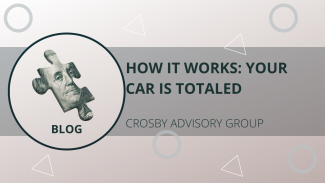
How It Works: Your Car is Declared Totaled
Your car is totaled – now what?
Insurance companies play a key role in declaring a car totaled, evaluating both the cost of repairs and the vehicle's pre-accident value. If you’re in an accident and wondering if your car may be considered totaled and what are the steps you should take, here are some helpful tips. Be sure to check with your insurance provider, policy, and state regulations as they tend to vary.
A car is considered "totaled" when the cost of repairing it exceeds a certain percentage of its value, making it financially impractical to restore. The threshold for when a car is considered totaled varies by state and insurer. In many cases, the damage must exceed 70-80% of the car's value for it to be declared a total loss. For example, if a car is worth $10,000 and the repairs would cost $8,000, the insurance company would likely consider it totaled. Some states have specific legal guidelines for this, while others leave it up to the insurer's discretion.
How is total loss value calculated?
To get started, the first step in determining whether a car is totaled (also known as a ‘total loss’) is to calculate its actual cash value at the time of the loss. This is how much your vehicle is worth after factoring in depreciation.
According to Carfax data, on average, vehicles depreciate more than 20% the first year and approximately 10% each additional year for the first five years.
Many insurance companies will have a claims adjuster assesses your vehicle’s condition. Then, they run the make, model and year of your vehicle through a database. The database generates an accurate estimate of your vehicle’s market value based on its mileage, condition, options and other comparative factors. It also considers the demand for a particular vehicle in your local market.
Another factor is the resale value of the parts and the metal. This factor, known as the “salvage value,” is considered along with the cost of repair. If a vehicle’s cost of repair plus its salvage value exceeds the vehicle’s actual value, it is typically declared a total loss.
After a car is declared a total loss, the vehicle's title will be branded as "salvage" or "total loss." Salvaged cars can sometimes be repaired and sold, but this varies by state regulations. If the car is repaired, it must pass a stringent inspection to ensure it’s roadworthy. Many buyers are hesitant to purchase salvaged vehicles due to potential safety concerns and lower resale value, so the process of selling such a car can be challenging.
How much does insurance pay for a totaled car?
Once a car is deemed totaled, the insurance company typically pays out the vehicle's actual cash value, which is its market value before the accident. This is different from the replacement cost and factors in depreciation. The insurance payout is meant to help the owner purchase a comparable used car. However, the payout amount can vary depending on your policy. If the owner still owes money on a car loan, the insurance payout will first go toward paying off that debt. In some cases, this may not cover the entire loan, leaving the owner responsible for the remainder.
If your vehicle is a total loss, you have two choices: You can take the cash settlement for the ACV of your vehicle or, if your state allows, you can “retain the salvage” and request the title and damaged vehicle be returned to you. Just know that many insurance companies will deduct the salvage value of the vehicle before selling it back to you. They also often report the damaged vehicle’s VIN number to a federal database so that any future buyers know it sustained major damage.
Most customers choose to take the settlement value, which is the figure generated by the industry-leading vehicle valuation database. Payment goes to the customer if the vehicle is owned outright. If there’s a lienholder, such as a bank or a credit union, payment goes to that lienholder. (Anything left over after paying the lienholder, however, goes back to the customer.) All payments are made after subtracting the customer’s deductible.
What insurance can help pay for a totaled car?
The two most common coverage types are collision and comprehensive. If you have these optional coverages on your auto policy, you may have protection up to the actual cash value amount if your vehicle is declared a total loss. Collision protects you if you hit another car or overturn. Comprehensive protects against events like fire, vandalism or hitting a deer.
Be sure to check your policy and provider before determining what path is best for your situation. If you need help, give our insurance team a call.
Disclaimer: Crosby Advisory Group, LLC provides financial planning, business growth strategies and Insurance protection. CAG is a registered investment advisor. Investing involves risk including the potential loss of principal. Consider all risks before investing.

